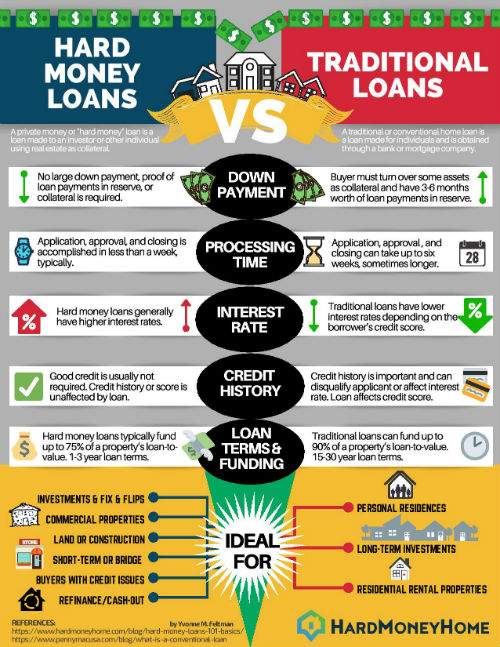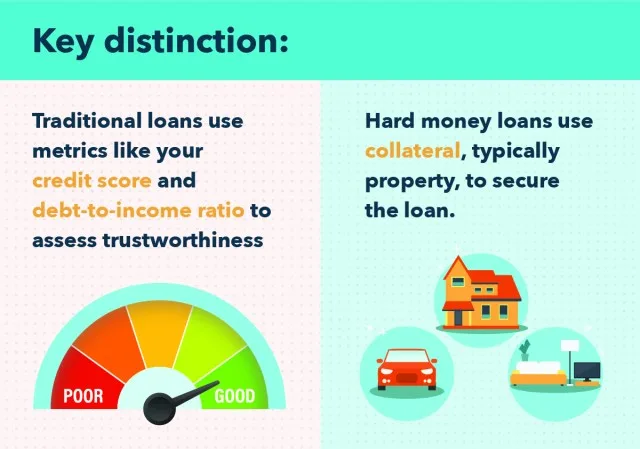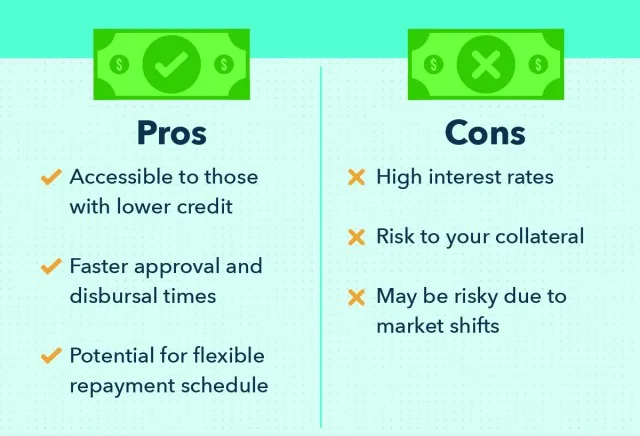If you’re in need of a loan and time is of the essence, you may find yourself wondering if hard money loans offer a quicker application process compared to traditional loans. While both options serve as valuable financial tools, this article will explore the efficiency of the application process specifically. By examining the key factors that contribute to the speed of approval and funding, you will gain insight into whether hard money loans present a faster solution for your borrowing needs.

Overview of Hard Money Loans
Hard money loans are a type of financing that is typically provided by private individuals or companies, rather than traditional financial institutions such as banks. These loans are secured by real estate assets, usually with a short-term repayment period. Hard money loans are often used by real estate investors or individuals who need quick access to funds for property purchases or renovations.
Definition of hard money loans
Hard money loans are short-term loans that are secured by real estate properties. Unlike traditional loans, hard money loans are not based on the borrower’s creditworthiness or income. Instead, the loan amount is typically based on the value of the property being used as collateral. This means that even borrowers with low credit scores or irregular income can still qualify for a hard money loan.
Features of hard money loans
Hard money loans have several distinct features that differentiate them from traditional loans. Firstly, hard money loans have higher interest rates compared to traditional loans. This is because hard money lenders take on higher risk by lending to borrowers with lower credit scores or less stable income. Additionally, hard money loans typically have shorter repayment periods, often ranging from a few months to a few years. Lastly, hard money loans may require the borrower to make a significant down payment or have a high Loan-to-Value (LTV) ratio.
Typical use cases for hard money loans
Hard money loans are commonly used in real estate investment scenarios where a quick closing or access to funds is crucial. They can be used to finance acquisitions, renovations, or property flips. For example, a real estate investor may use a hard money loan to purchase a property at an auction, where immediate payment is required. Hard money loans can also be utilized by borrowers who are unable to qualify for a traditional loan due to poor credit history or self-employment income.
Benefits of hard money loans
There are several benefits to using hard money loans. The most significant advantage is the speed at which the funds can be accessed. Unlike traditional loans, where the application process can be lengthy and time-consuming, hard money loans offer a much quicker turnaround. This is especially beneficial for real estate investors who need to close deals quickly or take advantage of time-sensitive opportunities. Additionally, hard money loans are often more flexible in terms of eligibility criteria, allowing borrowers with lower credit scores or non-traditional income sources to qualify.
Overview of Traditional Loans
Traditional loans, on the other hand, are typically provided by banks or other financial institutions. These loans have longer repayment terms and are based on the borrower’s creditworthiness, income, and other financial factors. Traditional loans are commonly used for various purposes, including personal or business expenses, home mortgages, or vehicle financing.
Definition of traditional loans
Traditional loans refer to loans provided by established financial institutions, such as banks, credit unions, or mortgage companies. These loans are often issued based on the borrower’s creditworthiness, income, employment history, and other financial factors. Traditional loans may have fixed or variable interest rates and are typically paid back over an extended period, ranging from several years to decades.
Features of traditional loans
Traditional loans have several distinguishing features. Firstly, they often have lower interest rates compared to hard money loans. This is because traditional lenders consider the borrower’s creditworthiness and income stability when determining the interest rate. Additionally, traditional loans usually have longer repayment terms, allowing borrowers to spread out their payments over an extended period. Traditional loans may also require a lower down payment or have more favorable LTV ratios, depending on the type of loan and the borrower’s financial profile.
Typical use cases for traditional loans
Traditional loans are versatile and can be used for various purposes. They are commonly used for home mortgages, where borrowers finance the purchase of a new home or refinance an existing mortgage. Traditional loans are also used for personal financing, such as funding education expenses, consolidating debts, or covering unexpected medical bills. Additionally, traditional loans serve as a primary source of business financing, allowing entrepreneurs to start or expand their businesses.
Benefits of traditional loans
Traditional loans offer several benefits to borrowers. One of the significant advantages is the potentially lower interest rates compared to hard money loans. This can result in substantial savings over the life of the loan. Additionally, traditional loans have longer repayment terms, which can provide borrowers with more flexibility in managing their monthly payments. Furthermore, traditional loans may offer more favorable terms, such as lower down payments or higher LTV ratios, depending on the borrower’s financial circumstances and the type of loan.
Application Process for Hard Money Loans
Applying for a hard money loan involves several steps, from pre-qualification to approval or rejection. Understanding the application process can help borrowers navigate the requirements and expectations of hard money lenders.
Initial pre-qualification
The first step in the application process for a hard money loan is the initial pre-qualification. During this stage, borrowers will need to provide basic information, such as their name, contact details, and a brief summary of the loan purpose. The lender will assess this information to determine if the borrower meets the initial eligibility criteria, such as minimum credit score requirements or specific property types.
Gathering required documentation
After the pre-qualification stage, borrowers will need to gather the necessary documentation to support their loan application. This typically includes property-related documents, such as the purchase agreement, title deeds, and property appraisal reports. Additionally, borrowers may be required to provide personal financial documents, such as bank statements, tax returns, and proof of income.
Submission of application
Once all the required documentation is collected, borrowers can formally submit their loan application to the hard money lender. The application package should include all the necessary forms, supporting documents, and any additional information requested by the lender. It is essential to ensure that the application is complete and accurate to avoid any delays or potential rejections.
Evaluation and due diligence
After the application submission, the hard money lender will evaluate the borrower’s financial profile and the property being used as collateral. This involves conducting due diligence, which may include property inspections, title searches, and verifying the borrower’s financial information. The lender will assess the overall risk associated with the loan before making a decision.
Approval or rejection
Based on the evaluation and due diligence, the hard money lender will determine whether to approve or reject the loan application. If approved, the lender will provide the borrower with a loan offer, detailing the loan terms, interest rates, repayment schedule, and any associated fees. If the application is rejected, the lender will provide reasons for the decision, allowing the borrower to explore alternative financing options.
Application Process for Traditional Loans
The application process for traditional loans follows a similar structure to hard money loans, but with some differences based on the lending institution and loan type.
Initial pre-qualification
The first step in applying for a traditional loan is also the initial pre-qualification. Borrowers provide basic information about themselves, their financial situation, and the loan purpose to determine if they meet the lender’s initial eligibility criteria. This may include minimum credit score requirements, income verification, and debt-to-income ratios.
Gathering required documentation
After the pre-qualification stage, borrowers will need to gather the necessary documentation to support their loan application for traditional loans. Typically, this includes personal financial documents, such as pay stubs, W-2 forms, tax returns, and bank statements. Borrowers may also need to provide additional information specific to the loan purpose, such as purchase agreements or business plans.
Submission of application
Once all the required documentation is collected, borrowers can formally submit their loan application to the traditional lender. This involves completing application forms provided by the lender and attaching the supporting documents. Similar to hard money loans, it is crucial to ensure that the application is complete and accurate to avoid delays or potential rejections.
Evaluation and due diligence
After the application submission, the traditional lender will evaluate the borrower’s financial profile and assess the risk associated with the loan. This involves conducting due diligence, which may include credit checks, income verification, employment history checks, and reviewing the borrower’s debt-to-income ratios. The lender may also require a property appraisal or inspection for mortgage loans.
Approval or rejection
Based on the evaluation and due diligence, the traditional lender will determine whether to approve or reject the loan application. If approved, the lender will provide the borrower with a loan offer, detailing the loan terms, interest rates, repayment schedule, and any associated fees. If the application is rejected, the lender will provide reasons for the decision, allowing the borrower to explore alternative financing options.

Speed of Processing
The speed of processing is often a critical factor for borrowers when comparing hard money loans to traditional loans. The efficiency and timeliness of the application process can significantly impact the borrower’s ability to secure funding promptly.
Factors influencing the speed of processing
Several factors can influence the speed of processing for both hard money loans and traditional loans. These factors include the complexity of the loan application, the responsiveness of the borrower in providing the required documentation, the workload of the lending institution, and the efficiency of their internal processes.
Efficiency of hard money loan application process
Hard money loans are known for their relatively expedited application process. Since hard money lenders focus primarily on the value of the collateral, they can often make lending decisions more quickly. Additionally, the flexibility of hard money loans allows borrowers with unconventional income sources or lower credit scores to qualify, reducing the time spent on extensive credit checks or income verifications.
Efficiency of traditional loan application process
The application process for traditional loans can be more time-consuming due to the stricter eligibility criteria and more comprehensive documentation requirements. Traditional lenders often require extensive credit checks, income verifications, and employment history checks, which can lengthen the evaluation process. The need for property appraisals and legal processes, such as title searches, can also contribute to longer processing times.
Comparison of average processing times
While the speed of processing can vary depending on various factors and individual circumstances, hard money loans typically have shorter processing times compared to traditional loans. Hard money loans may be processed within a few days or weeks, allowing borrowers to secure funding quickly. In contrast, traditional loans can take several weeks or even months to complete, especially for more complex loan requests or during busy periods for lenders.
Impact of borrower’s preparedness
The preparedness of the borrower can also significantly impact the speed of processing for both hard money loans and traditional loans. Promptly providing all the required documentation, accurately completing the application forms, and promptly responding to any requests from the lender can expedite the processing timeline for both loan types.
Flexibility in Loan Criteria
Another important aspect to consider when comparing hard money loans to traditional loans is the flexibility of the loan criteria. Flexibility in loan criteria can impact the borrower’s ability to qualify and the overall duration of the application process.
Flexibility of hard money loan criteria
Hard money loans are known for their flexibility in loan criteria. While hard money lenders still consider the value of the collateral, they often place less emphasis on the borrower’s creditworthiness or income stability. This means that borrowers with lower credit scores or unconventional income sources, such as self-employed individuals, may find it easier to qualify for hard money loans. The flexibility in loan criteria can help expedite the application process, as there may be fewer requirements to satisfy.
Rigidity of traditional loan criteria
Traditional loans typically have more rigid loan criteria compared to hard money loans. Traditional lenders place greater importance on the borrower’s creditworthiness, income stability, and employment history when evaluating loan applications. This can present challenges for borrowers with lower credit scores, sporadic income, or non-traditional employment situations. The rigidity of the loan criteria may result in additional documentation requests, extended evaluation periods, or potential application rejections.
Impact on application process duration
The flexibility of hard money loan criteria can contribute to shorter processing times compared to traditional loans. With fewer stringent requirements, hard money lenders can focus on the value of the collateral and swiftly assess the borrower’s eligibility. This streamlined approach can expedite the application process and allow borrowers to secure funding more quickly. In contrast, the rigorous loan criteria of traditional loans may involve additional checks and verifications, resulting in more extended processing times.

Credit Requirements
Credit requirements play a significant role in both hard money loans and traditional loans, influencing the borrower’s eligibility and the overall application process.
Credit score criteria for hard money loans
Hard money loans are known for their leniency regarding credit scores. While hard money lenders may still consider the borrower’s credit history, they typically focus more on the collateral’s value. This means that borrowers with low credit scores or past credit issues may still qualify for a hard money loan, as long as the property being used as collateral has sufficient value.
Credit score criteria for traditional loans
Traditional loans place greater emphasis on the borrower’s creditworthiness compared to hard money loans. Banks and other traditional lenders often have specific credit score requirements that borrowers must meet to qualify for a loan. Higher credit scores generally result in more favorable loan terms and interest rates, while lower credit scores may lead to higher interest rates or loan denials.
Evaluation of creditworthiness
For both hard money loans and traditional loans, lenders evaluate the borrower’s creditworthiness to assess the risk associated with the loan. This evaluation includes reviewing the borrower’s credit history, payment patterns, outstanding debts, and any negative credit events. The creditworthiness evaluation helps lenders determine the terms, interest rates, and overall eligibility of the borrower.
Effect on application process timeline
The impact of credit requirements on the application process timeline can vary depending on the loan type. For hard money loans, the leniency in credit score requirements can expedite the process, allowing borrowers to secure funding even with lower credit scores. In contrast, the stricter credit score criteria for traditional loans may result in additional credit checks, evaluations, or documentation requests, potentially lengthening the application process.
Loan Amounts and LTV Ratios
The loan amounts and Loan-to-Value (LTV) ratios can differ significantly between hard money loans and traditional loans, affecting the borrower’s ability to finance their projects and the overall application process.
Maximum loan amounts for hard money loans
Hard money loans often have higher maximum loan amounts compared to traditional loans. The loan amount for hard money loans is primarily based on the value of the collateral property. Hard money lenders typically offer loans with LTV ratios ranging from 60% to 75% of the property’s appraised value. This higher loan amount can provide borrowers with more financing options and the ability to pursue more significant real estate investments.
Maximum loan amounts for traditional loans
Traditional loans, particularly mortgage loans, may have stricter limitations on the maximum loan amounts. Lenders usually consider the borrower’s income, creditworthiness, and the type of property when determining the loan amount. Traditional lenders typically offer loans with LTV ratios ranging from 80% to 97% of the property’s appraised value. This can result in lower loan amounts compared to hard money loans.
Loan-to-Value (LTV) ratio differences
The Loan-to-Value (LTV) ratio is an essential factor in determining the loan amount and the overall risk for both hard money loans and traditional loans. The LTV ratio represents the loan amount as a percentage of the property’s appraised value. Hard money loans generally have lower LTV ratios, meaning borrowers can obtain a smaller portion of the property’s value as a loan. Conversely, traditional loans often offer higher LTV ratios, allowing borrowers to finance a larger portion of the property’s value.
Relevance to application process duration
The loan amounts and LTV ratios can impact the application process duration in several ways. Higher LTV ratios in traditional loans may involve additional evaluations, such as property appraisals and inspections, resulting in a more extended processing timeline. Hard money loans, with their lower LTV ratios and potentially higher loan amounts, may require more in-depth property assessments and due diligence from the lender, potentially lengthening the processing time.

Interest Rates and Fees
Comparing the interest rates and fees between hard money loans and traditional loans is crucial to understanding the overall cost of borrowing and the impact on the application process.
Comparison of interest rates
Hard money loans generally have higher interest rates compared to traditional loans. This is due to the higher risk associated with hard money lending, where borrowers with lower credit scores or unconventional income sources are often targeted. The interest rates for hard money loans typically range from 7% to 15% or higher, depending on the lender, borrower’s profile, and the loan terms. In contrast, traditional loans, particularly those issued by banks or credit unions, often offer lower interest rates, ranging from 3% to 7% or lower, depending on factors such as creditworthiness, loan term, and prevailing market rates.
Comparison of fees and closing costs
In addition to interest rates, borrowers should consider the associated fees and closing costs when comparing hard money loans to traditional loans. Hard money loans may have higher upfront fees, such as loan origination fees or points, which are a percentage of the loan amount. These fees can range from 1% to 10% or more, depending on the lender and the loan terms. Traditional loans usually involve closing costs, which include fees for appraisal, credit checks, title searches, and attorney fees. However, these closing costs may be lower compared to the upfront fees of hard money loans.
Evaluation of impact on application process speed
The impact of interest rates and fees on the application process speed can vary depending on the loan type and the borrower’s individual circumstances. Higher interest rates in hard money loans may result in faster loan approval and disbursement, as lenders can focus more on the collateral’s value rather than extensive credit evaluations. However, the higher upfront fees of hard money loans may require additional financial considerations and potentially longer processing times. Traditional loans, with their lower interest rates and typically lower upfront fees, may involve more extensive credit evaluations and thus have longer processing times.
Availability and Accessibility
The availability and accessibility of hard money loans and traditional loans can differ, affecting the efficiency and ease of the application process.
Accessibility of hard money loans
Hard money loans are often considered more accessible for borrowers who may have difficulty qualifying for traditional loans. Hard money lenders typically focus more on the value of the collateral rather than the borrower’s creditworthiness or income stability. This accessibility enables borrowers with lower credit scores, non-traditional income sources, or unique property types to secure financing through hard money loans. Additionally, hard money lenders may offer more flexibility in loan terms, allowing borrowers to tailor the financing to their specific needs.
Accessibility of traditional loans
Traditional loans, particularly those offered by banks and credit unions, have wider availability for borrowers. These lenders typically have established branches, online platforms, and extensive networks, making it easier for borrowers to access traditional loan products. However, traditional loans may have stricter eligibility criteria, requiring higher credit scores, stable income, and more significant financial documentation. This can limit the accessibility of traditional loans for borrowers with lower credit scores or unconventional income sources.
Impact on application process efficiency
The accessibility of hard money loans can contribute to a more efficient application process, particularly for borrowers who may face challenges qualifying for traditional loans. The reduced emphasis on credit scores and income stability allows for simplified evaluations and potentially shorter processing times. Additionally, the availability of hard money lenders who specialize in real estate investments or non-traditional borrowers can provide borrowers with more accessible financing options.
In conclusion, the application process for hard money loans is often quicker than traditional loans, primarily due to the focus on collateral value rather than creditworthiness or income stability. Hard money loans offer flexibility in loan criteria, potentially expedited processing times, and access to financing even for borrowers with lower credit scores or non-traditional income sources. On the other hand, traditional loans provide lower interest rates, longer repayment terms, higher loan amounts (depending on LTV ratios), and broader availability through established financial institutions. Understanding the differences between hard money loans and traditional loans allows borrowers to choose the most suitable financing option for their needs.




